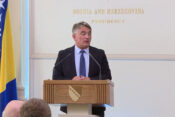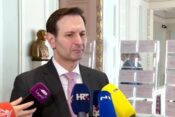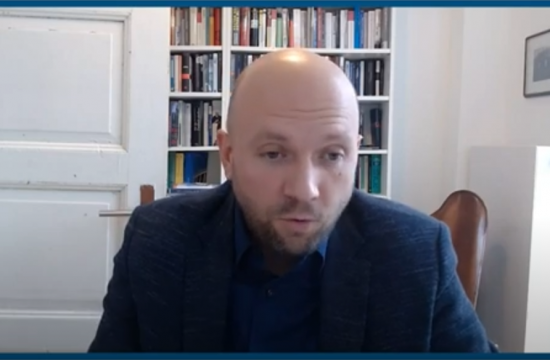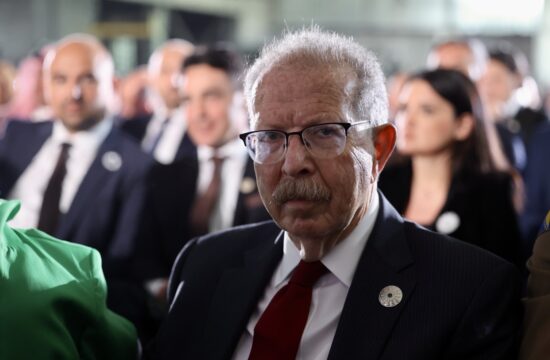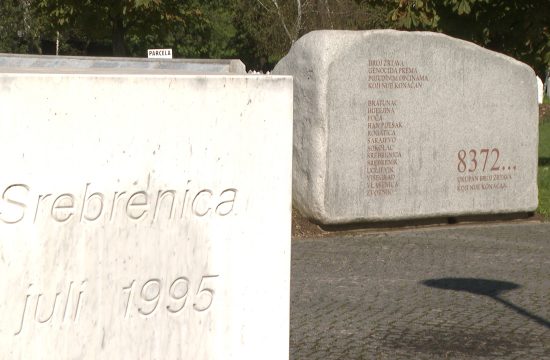
Bosnia's Serb-dominated entity Republika Srpska maintains its stance on military neutrality and the only way out of the current crisis in the country is the unconditional government formation, Bosnian Serb leader and member of the State tripartite Presidency Milorad Dodik said on Wednesday.
Speaking for the entity public broadcaster RTRS, Dodik accused the Bosniaks, one of the three major ethnic groups in Bosnia, of imposing the NATO membership as a condition to form the state-level government.
“Republika Srpska acts in line with its commitments, and that's the military neutrality. Now we're paying the price of made up democratic institutions in which Bosniaks created a story of the NATO membership and set it as a condition to form the government. They act in line with theirs and we act in line with our policies, which proves Bosnia and Herzegovina cannot exist,” said Dodik.
The statement comes amid the ongoing crisis with the government formation, ten months after the general election was held in the country.
Although the leaders of three strongest nationalist parties signed an agreement that among other things stipulates the principles to form the government, the statements they gave in the following days showed the deal was not likely to be implemented within 30 days, as agreed.
The leaders of the Alliance of Independent Social Democrats (SNSD), the Croat Democratic Union (HDZ BiH) and the Party of Democratic Action (SDA) put the signatures on the document last week.
The country's road to NATO which was vaguely mentioned in the leaders’ agreement is a stumbling stone and has been preventing the government formation in the post-election period.
While Bosniak and Croat representatives support the membership, the Serb political leadership is against it and is resolute in maintaining the stance on military neutrality.
Speaking for RTRS, the Serb leader said it was not possible to introduce the ‘one man, one vote’ principle, which Presidency member Zeljko Komsic advocates.
Republika Srpska entity is ready to accept everything that the Constitution stipulates, said Dodik, who is also the leader of the SNSD party.
Bosnia consists of two semi-autonomous regions, the Federation (FBiH) dominated by the Bosniaks and the Croats, and the Serb-dominated Republika Srpska. Each of the three major ethnic groups and both entities, as stipulated by the Constitution, share the power in the state-level institutions.
But, Dodik has often been advocating secession of the Serb region and its merging with Serbia.
“Bosnia and Herzegovina was a mistake in 1995, because it was not supposed to be established at all, which all the previous years confirm, said Dodik stressing that “at least two of the three constituent peoples are not in favour of it.”
The hardline Serb nationalist reiterated that Bosnia did not deserve to exist and that its territory should have been redefined by having it divided into three states for each of the ethnic groups – Republika Srpska, Herceg-Bosnia and Bosnia, while setting up quality standards.
“Everything that is done in political Sarajevo goes towards making Bosnia and Herzegovina dysfunctional. They ignore the talk on rights of the Croats as one of the constituent peoples, while Republika Srpska was never given the right to exist and a possibility of its importance is being eliminated. All Bosniak parties have the same stance on that and why is it a problem that we feel animosity towards Bosnia and Herzegovina,” wonders Dodik.
As for the current crisis, Dodik said the only way out of it is the unconditional government formation.
“We're not running there but we believe the functionality is very jeopardized,” he stressed, adding that this situation is preventing many processes.
A common policy in the country can be built up only with the legitimate representation of the three ethnicities, he emphasised, adding that anything else is “speculations where everyone is a loser.”
Dodik also touched upon the involvement of foreign ambassadors in the country, noting that they do have the right to hold meetings but have no right to interfere with internal matters of Bosnia and Herzegovina which they, according to him, “massively do.”
“We are legalists, we respect the legitimate existence of the Constitution, we believe that imposed things in Bosnia and Herzegovina have to be discussed. We didn't say there should be no judiciary, maybe the prosecution at the level of Bosnia and Herzegovina, but it should certainly not be the way it is now, under political influence,” he underlined.
“We can pass the decisions in Bosnia and Herzegovina in a consensus but without outvoting. The Serbs won't be outvoted, Republika Srpska and not Bosnia and Herzegovina is the final place of decisions.”

